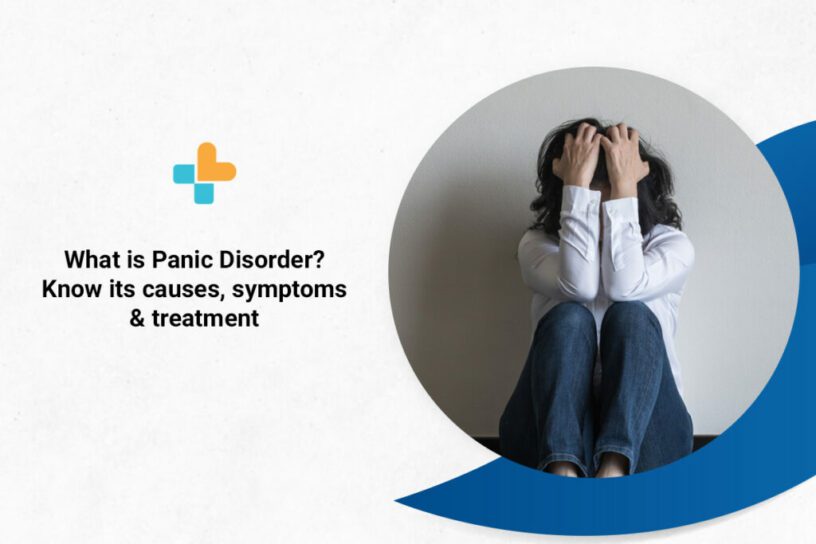You have to attend an interview or an exam that is crucial in terms of your career, you need to confront your boss about a task where he committed a mistake, or you are on the verge of revealing a secret to your partner that you have held for ages. In such situations, you may experience a sudden shock – your throat is dry, you are hands and feet begin to tremble and you begin to sweat profusely, among other symptoms. This is a classic case of a panic attack.
Panic attacks are not uncommon among people and are experienced a couple of times throughout their lifetimes. it is the physiological reactions that the body experiences in the face of an assumed threat.
In this blog, we will give you a clear understanding of what is a panic disorder and show you how it is different from a regular panic attack. We will also ascertain its causes, symptoms and treatment measures.
What is a Panic Disorder
A panic attack is a sudden episode of intense fear, anxiety, and nervousness that triggers various physical and emotional responses for no apparent cause. This episodic trauma usually ends when a stressful situation or the problem that caused these reactions seems under control. Panic attacks when frequent in number and irregular in the triggers that cause them are then diagnosed as panic disorders.
Panic Disorder Causes
Panic attacks can be triggered by various causes in different people. But those who are diagnosed have a few common panic disorder causes that form a distinct pattern whenever they experience an attack.
Family history
It might be a case where an individual having panic disorder might have a genetic inheritance.
Stressful situations
Panic disorder can be a result of stress. A person having panic disorder may experience a high level of stress even under less stressful situations.
Triggering situations and pessimistic personality- A person having panic disorder may feel certain situations, actions, and words might trigger them and as a result, they have these attacks.
Changes in brain function
Certain parts of our brain and some biological processes play a role in spikes of anxiety, fear, stress, and other related symptoms. These chemical changes in the brain cause one to experience these symptoms.
Panic Disorder Symtoms
Panic disorder includes a range of symptoms all of which may or may not be common among patients. Listed below are the typical panic disorder symptoms
- Sense of impending doom or danger
- Fear of loss of control or death
- Rapid, pounding heart rate
- Sweating
- Trembling or shaking
- Shortness of breath or tightness in your throat
- Chills
- Hot flashes
- Nausea
- Abdominal cramping
- Chest pain
- Headache
- Dizziness, lightheadedness or faintness
- Numbness or tingling sensation
- A feeling of unreality or detachment
Anyone experiencing these symptoms on a regular basis should be seeking medical attention to treat the condition so as to improve their overall quality of life.
Panic Disorder Treatment
There are several treatments for this disorder depending upon the type of panic disorder a person has and the intensity of it. Some of the treatments include:
Talking to a healthcare provider
A healthcare provider will take your family history, your medical history and other factors into consideration and conduct certain medical examinations to provide you with the right advice. They may refer you to a mental health professional (psychiatrist, psychologist, etc.) or prescribe certain medicines depending upon the diagnosis.
Medication
A healthcare provider may prescribe certain medications to help one with the disorder. These medications include- antidepressants, anti-anxiety medicines, etc. It is imperative to take these medications with a doctor’s prescription and not over the counter.
Psychotherapy
Cognitive behavioral therapy (CBT)
This type of therapy is believed to treat this disorder and focus on teaching one different way of thinking, behaving, and reacting to the symptoms that occur during a panic attack. One can control their responses when they practice these ways and have fewer chances of having recurrent attacks. This therapy focuses on exposure therapy and helps people to face their fear and control them considerably. This exposure therapy can be clubbed with relaxation exercises which can be like a reward for the exposure therapy.
Other ways include talking to peers, family, and relatives, doing physical and mental exercises like calculations to divert the mind, using stress relieving balls, etc.
If you are wondering where you can seek these treatments, then Ayu Health is your one-stop shop for all your concerns. Ayu Health’s experts can help you with this disorder and improve your quality of life. To know more visit their website
If you need additional resources or would like to speak with a professional, feel free to contact us right away at +91 636-610-0800 or book an appointment on our website. Our expert team is here to assist and support you every step of the way.
Our Hospital Locations
General Surgery Hospitals in Chandigarh | General Surgery Hospitals in Bangalore | General Surgery Hospitals in Jaipur | General Surgery Hospitals in NCR | General Surgery Hospitals in Hyderabad
Our Doctors
General Surgery Doctors in Chandigarh | General Surgery Doctors in Bangalore | General Surgery Doctors in Jaipur | General Surgery Doctors in NCR | General Surgery Doctors in Hyderabad
About the Author

Dr. S. Goel
Dr. S. Goel is a renowned Internal Medicine Specialist currently practicing at Ayu Health, Bangalore. He is a Specialist in Internal Medicine, Diabetes HTN, Paediatric Care, and Family Medicine.




